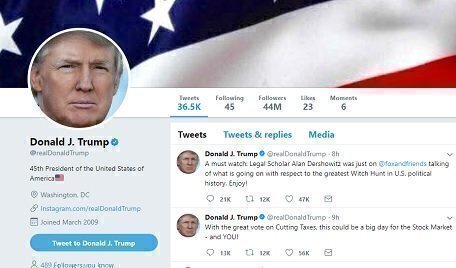Late Tuesday night, a federal judge in California temporarily stopped actions by the Trump administration to end parts of DACA, or the Deferred Action for Childhood Arrivals program, partly based on the meaning of President Trump's Twitter messages.
 The subject of DACA has consumed much of the political debate in Washington this week. But there is an equal flurry of activity in the legal system about the moves, which could see about 700,000 people who arrived from other countries as children forced to leave the United States starting next month.
The subject of DACA has consumed much of the political debate in Washington this week. But there is an equal flurry of activity in the legal system about the moves, which could see about 700,000 people who arrived from other countries as children forced to leave the United States starting next month.
In his 49-page ruling in the District Court of North California, U.S. District Court judge William Alsup granted a request by the University of California for a nationwide injunction to force the Trump administration “to maintain the DACA program on a nationwide basis on the same terms and conditions as were in effect before the rescission on September 5, 2017, including allowing DACA enrollees to renew their enrollments.”
Exceptions in Judge Alsup’s orders include new applicants to the DACA program and the allowance of measures needed to be taken against individual program members for national security reasons.
Judge Alsup also said he believed the University of California would succeed on “the merits of their claim that the rescission was arbitrary and capricious and must be set aside under the APA.” The APA is the Administrative Procedure Act, which requires a period of public notice and comment before some executive actions can be taken.
Alsup also said the one of Trump administration’s reasons for ending DACA, that it was illegally implemented by the Obama administration, was based on a flawed legal premise.
“When agency action is based on a flawed legal premise, it may be set as aside as ‘arbitrary, capricious, an abuse of discretion, or otherwise not in accordance with law,’” said Alsup, citing previous court decisions.
The judge also cited Twitter messages from President Trump as a reason to delay the DACA wind down.
“One such possibility suggested by plaintiffs is that the rescission was contrived to give the administration a bargaining chip to demand funding for a border wall in exchange for reviving DACA. A presidential tweet after our hearing gives credence to this claim,” he said.
“These theories deserve the benefit of the full administrative record. It will be impossible to litigate this case to a fair and final conclusion before March 5,” Alsup added.
But Judge Alsup also cited a September 2017 Twitter message from President Trump, supporting the DACA program, as another reason for the injunction. “Does anybody really want to throw out good, educated and accomplished young people who have jobs, some serving in the military? Really!” was the Trump Twitter message cited by Alsup.
“For the reasons DACA was instituted, and for the reasons tweeted by President Trump, this order finds that the public interest will be served by DACA’s continuation,” he concluded.
The Trump administration and the Justice Department will likely appeal the decision. But the current negotiations between the President and Congress could alter the court’s injunction, if a DACA compromise is reached in the near future.
Scott Bomboy is the editor in chief of the National Constitution Center.







